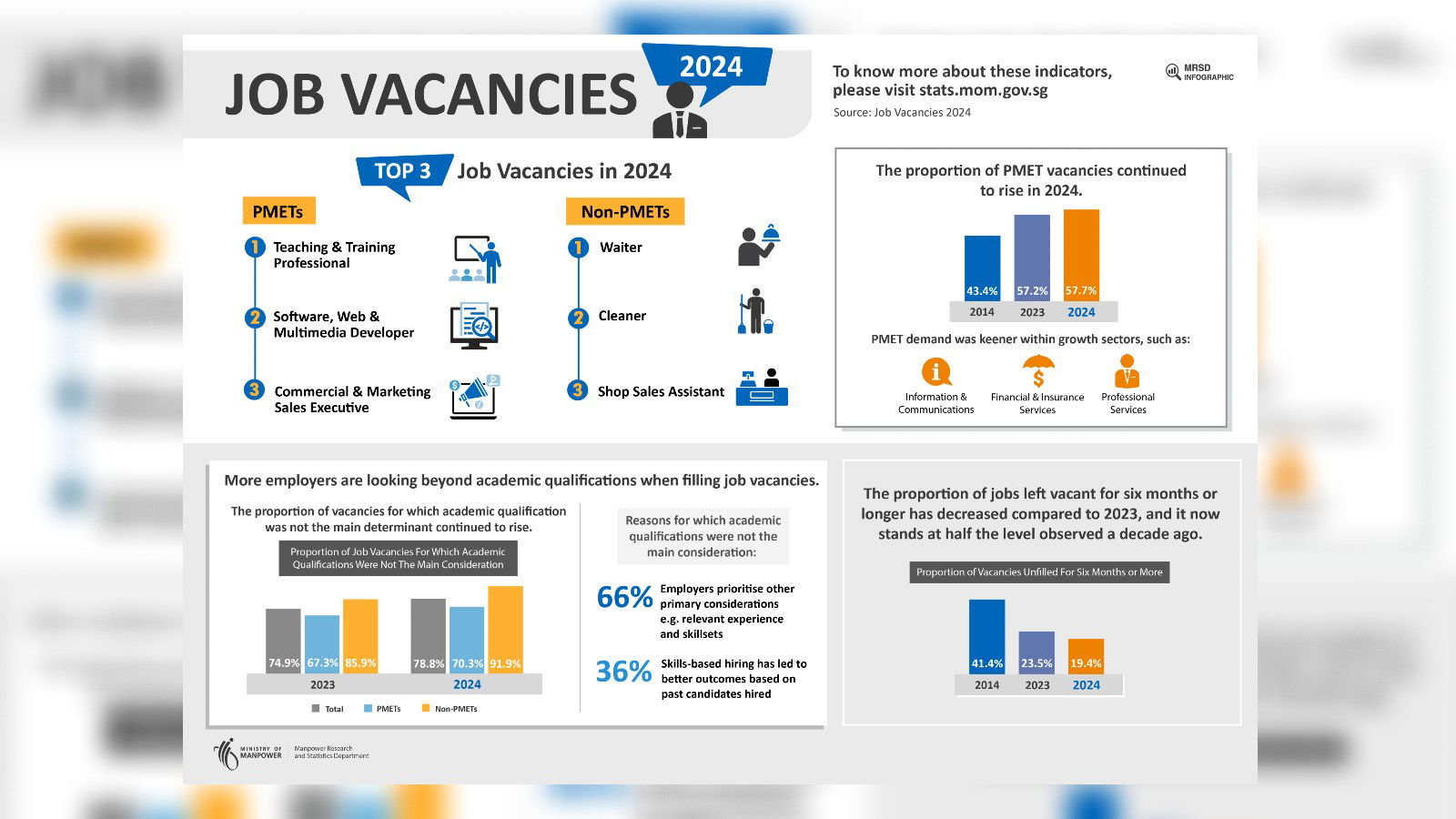share on
A strong demand for PMET roles was observed, along with a growing shift towards skills-based hiring over traditional academic qualifications.
Singapore's labour market remained tight in 2024, with job vacancies outpacing the number of jobseekers. According to the Ministry of Manpower's (MOM) latest Job Vacancies 2024 report, nearly half (45.7%) of job vacancies in Singapore were newly created, driven by business growth and industry shifts.
While the proportion of new positions slightly decreased from 47.3% in 2023, it continued to rise over the long term. Most new roles were due to business expansion (54.7%), followed by the creation of new functions (31.2%) and job restructuring (6.5%).
New job creation and industry trends
- Information & communications: Highest proportion of newly created positions (75.1%), driven by digital transformation and tech innovation.
- Professional services (49.1%) and financial & insurance services (48.9%): Above-average job creation.
- Retail trade and food & beverage services: A decline in new job creation as spending shifted towards overseas travel.
PMET roles see strong demand
The demand for professionals, managers, executives, and technicians (PMETs) continued to rise, making up 57.7% of total job vacancies, up from 57.2% in 2023. Key growth sectors driving this demand included:
- Information & communications (15.0%)
- Financial & insurance services (10.4%)
- Professional services (10.2%)
Among the most sought-after roles were software, web, and multimedia developers, and financial advisers, highlighting the rapid expansion of the digital economy and finance sector.
Skills-based hiring gains traction
In 2024, 78.8% of job vacancies prioritised skills and experience over academic qualifications, up from 74.9% in 2023. Among these, 66.0% of employers considered other factors such as skills and experience when selecting candidates, while 36.1% reported that skills-based hiring led to faster hiring, a broader talent pool, and better employee performance. Additionally, 58.1% of vacancies were open to candidates with lower qualifications than originally stated, reflecting a more inclusive hiring approach.
Labour Market Flexibility and Workforce Transformation
Singapore’s job market also saw improvements in vacancy fill rates. The percentage of long-term unfilled vacancies (six months or more) dropped to 19.4% in 2024, decrease from 23.5% in 2023. This decline was most pronounced in non-PMET jobs which fell from 54.2% in 2014 to 27.2% in 2024 thanks to efforts such as foreign manpower, technology adoption, job redesign, and skills upgrading. However, non-PMET jobs are still harder to fill compared to PMET roles, which saw stronger hiring outcomes at 14.4% as compared to 27.2%.
To support businesses in workforce transformation, the government has introduced initiatives such as:
- Job Transformation Maps (JTMs): Provide actionable insights on the impact of technology and automation on businesses and jobs.
- SkillsFuture Workforce Development Grant (WDG): Support upskilling, career transitions, and simplify application processes.
- Support for Job Redesign under the Productivity Solutions Grant (PSG-JR): Redesign jobs and make them more productive and attractive to jobseekers.
- Flexible Work Arrangements (FWAs): Improve job accessibility and work-life balance.
MOM has affirmed that the Government will continue to support Singaporeans in managing their career development amid economic changes. Workers can leverage the CareersFinder feature on Workforce Singapore’s (WSG) MyCareersFuture portal to explore career options based on their skills and experience.
Additionally, they can access career coaching services from WSG and NTUC’s Employment and Employability Institute, including the Polaris programme for personalised guidance. Workers can also utilise their SkillsFuture Credit, which includes a S$500 opening credit and a S$500 top-up, to cover eligible career guidance services.
share on


